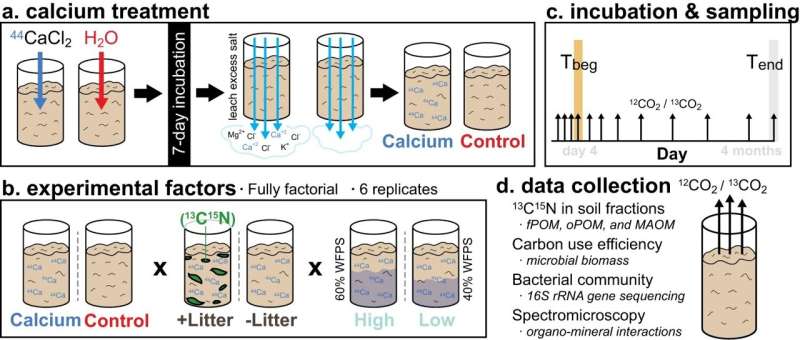This article has been reviewed according to Science X's editorial process and policies. Editors have highlighted the following attributes while ensuring the content's credibility:
fact-checked
peer-reviewed publication
trusted source
proofread
Adding calcium to soils can help increase organic matter, trap more carbon

Farmers add calcium to their soil for many reasons related to increasing crop yields—including regulating pH and improving soil structure.
Using the Canadian Light Source (CLS) at the University of Saskatchewan, scientists from Cornell University and Purdue University have identified a previously undiscovered mechanism triggered by calcium when it's added to soil. Their finding could lead to more strategic use of the mineral in agriculture.
Researchers already knew that calcium impacts the way organic matter is stabilized in soil. What wasn't known was whether calcium had an effect on which microbes were involved and how they acted. Microbes are microscopic organisms that live in the air, soil, and water; in soil, they process soil organic matter and help promote plant growth.
"We showed that by adding calcium to soil, we changed the community of microbes in the soil and the way they process organic matter," says lead researcher Itamar Shabtai, an assistant scientist with the Connecticut Agricultural Experiment Station. "They processed it in a more efficient manner—more carbon was retained in the soil, and less was lost to the atmosphere as CO2."
Carbon, which makes up about half of the organic matter in the soil, is incredibly important to almost all soil properties, says Shabtai, who carried out the research as part of his postdoctoral fellowship at Cornell. "Soils that contain more carbon are generally healthier. They are better able to hold on to water in drought conditions. Soils with higher amounts of organic carbon are also able to deliver nutrients more efficiently to plants and promote plant growth, and they're more resistant to erosion."
From a global point of view, soils contain significant amounts of carbon, more than plants and the atmosphere combined, says Shabtai, so holding on to that carbon can help address climate change. "If we can increase carbon in soil, we can perhaps make a dent in the increase in atmospheric CO2 that we're seeing."
The researchers used the SGM beamline at the CLS to measure the amount of plant matter decomposed following the addition of calcium, while the Mid-IR beamline enabled them to identify and quantify the stabilized carbon in the soil—data impossible to gather in any other way, says Shabtai.
Their findings can potentially benefit agricultural producers by giving them another tool to help maintain and improve the organic matter in their soils. "Now that we have a better understanding of how calcium can impact how microbes improve soil carbon, we can perhaps use soil amendments that contain calcium and are already being used by farmers—such as lime and gypsum—in a way that can benefit soil organic matter."
More information: Itamar A. Shabtai et al, Calcium promotes persistent soil organic matter by altering microbial transformation of plant litter, Nature Communications (2023). DOI: 10.1038/s41467-023-42291-6
Journal information: Nature Communications
Provided by Canadian Light Source


















